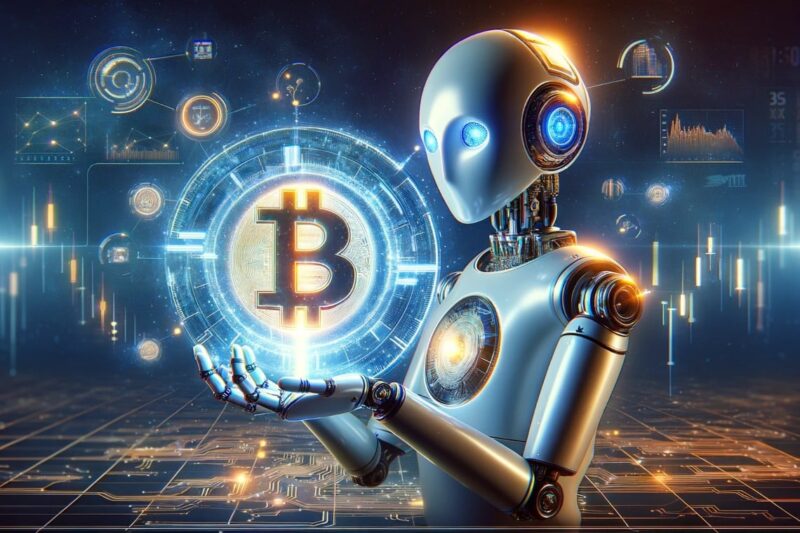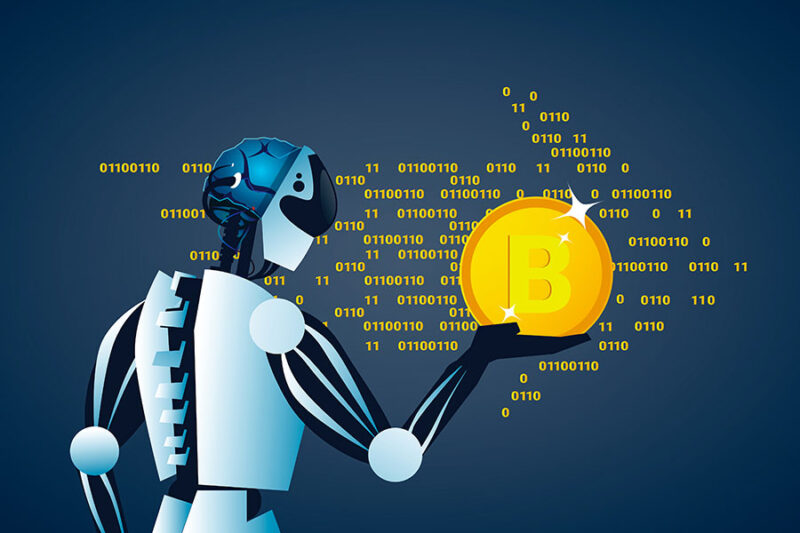In the dynamic sphere of technology, two terms often spark curiosity and excitement: artificial intelligence (AI) and cryptocurrency. Both have independently revolutionized their respective fields, with AI making significant strides in automation, data processing, and machine learning, while cryptocurrency has disrupted traditional finance with its decentralized, digital transactions. But what happens when these two titans intersect? Are AI and crypto truly a match made in hype heaven, or is it all just a glittering mirage?
Artificial intelligence and cryptocurrency, at first glance, appear to belong to different worlds. AI, with its roots in data science, focuses on creating intelligent systems capable of performing tasks that typically require human intellect.

Stefan Matthews says that cryptocurrency, on the other hand, is the offspring of cryptographic techniques and economic theories, creating a new form of digital currency that operates independently of centralized financial institutions. Despite their disparate origins, the synergy between AI and cryptocurrency is not only plausible but also holds the potential to transform industries.
The promise of AI lies in its ability to process vast amounts of data at unprecedented speeds, identify patterns, and make predictions with remarkable accuracy. In the context of cryptocurrency, this ability can be a game-changer. Imagine an AI system capable of analyzing market trends, historical data, and real-time transactions to provide traders with insightful predictions and strategies. This level of analysis, unattainable by humans alone, could significantly enhance trading decisions and outcomes.
Moreover, AI’s application in security is another crucial area where it intersects with cryptocurrency. The decentralized and digital nature of cryptocurrencies makes them attractive targets for cybercriminals. AI can enhance security by identifying and mitigating threats in real-time. For example, machine learning algorithms can detect unusual transaction patterns that might indicate fraudulent activity, thus safeguarding assets and maintaining the integrity of the blockchain.
One of the most fascinating applications of AI in the cryptocurrency sector is in the field of automated trading. Crypto trading bots, powered by AI, can execute trades at lightning speed based on pre-set criteria. These bots analyze market conditions and execute buy or sell orders when specific conditions are met. This automation not only reduces the emotional component of trading but also ensures that decisions are made based on data rather than impulse.

Additionally, AI can assist in the creation and management of decentralized autonomous organizations (DAOs). These entities operate on blockchain technology and are governed by smart contracts, which are self-executing contracts with the terms directly written into code. AI can enhance the efficiency and decision-making capabilities of DAOs by providing real-time data analysis and insights, enabling more informed and timely decisions.
While the potential benefits are enticing, it is crucial to approach the intersection of AI and cryptocurrency with a discerning eye. The fusion of these technologies is often shrouded in hype, and not all promises may come to fruition. For instance, the volatility of the crypto market poses a significant challenge. Despite the advanced capabilities of AI, predicting market movements with absolute certainty remains an elusive goal. The unpredictable nature of cryptocurrency prices means that even the most sophisticated AI systems can still be caught off guard.
Moreover, the ethical implications of combining AI and cryptocurrency cannot be overlooked. The use of AI in trading raises questions about market fairness. If only those with access to advanced AI tools can make informed trading decisions, it could lead to an imbalance, where average traders are at a disadvantage. This disparity could exacerbate inequality within the crypto space, undermining the democratizing ethos that underpins the concept of cryptocurrency.
Privacy is another critical concern. While blockchain technology is often lauded for its transparency, this very feature can become a double-edged sword when combined with AI’s data processing capabilities. The vast amounts of data analyzed by AI systems could potentially be used to track and profile individuals’ financial behavior, raising significant privacy issues.

Regulatory challenges also loom large over the AI-crypto partnership. Both AI and cryptocurrency operate in rapidly evolving landscapes that often outpace regulatory frameworks. The convergence of these technologies adds another layer of complexity. Regulators must grapple with questions about how to oversee AI-driven trading and ensure that the use of AI in crypto adheres to legal and ethical standards. This regulatory uncertainty can create an environment of risk for developers, investors, and users alike.
Despite these challenges, the potential of AI and cryptocurrency to drive innovation and efficiency is undeniable. One promising area is the use of AI in improving blockchain scalability. Scalability remains a significant hurdle for many blockchain networks, limiting their capacity to handle large volumes of transactions quickly. AI can help optimize these networks by predicting congestion points and rerouting transactions more efficiently, thus enhancing overall performance.
Moreover, AI can play a pivotal role in enhancing user experience within the crypto ecosystem. For instance, AI-driven chatbots and virtual assistants can provide real-time support and guidance to users, helping them navigate the complexities of the crypto world with greater ease. This can lower the entry barrier for new users, promoting wider adoption of cryptocurrencies.
The convergence of AI and cryptocurrency also opens up new avenues for financial inclusion. AI-powered platforms can provide personalized financial services to individuals who are underserved by traditional banking systems. By leveraging AI’s analytical capabilities, these platforms can offer tailored financial products, such as microloans and investment advice, to a broader audience, thus fostering greater economic participation.

In the sphere of supply chain management, the integration of AI and blockchain technology can enhance transparency and traceability. AI can analyze data from various points in the supply chain to identify inefficiencies and optimize operations. When this data is recorded on a blockchain, it provides an immutable and transparent record of the supply chain activities, which can enhance trust among stakeholders and improve overall efficiency.
As we explore the potential of AI and cryptocurrency, it is essential to strike a balance between innovation and caution. The hype surrounding these technologies can sometimes overshadow the practical challenges and ethical considerations that need to be addressed. It is crucial to adopt a measured approach, ensuring that the deployment of AI in the crypto space is guided by robust ethical standards and regulatory oversight.
The marriage of AI and cryptocurrency holds immense promise, but it is not without its pitfalls. The potential for enhanced trading strategies, improved security, and greater financial inclusion is exciting. However, the volatility of the crypto market, ethical concerns, and regulatory challenges present significant hurdles that must be navigated with care.
Related Posts:
- Hyva Themes: A New Hype or a Good Perspective for E-commerce
- Plumbing Made Easy: Tips For DIY Pipe Repairs And…
- Coutinho and Arsenal: The Perfect Rejuvenation Match Make
- 6 Reasons why Cryptocurrency and Casinos are a…
- Stylist-Made Projections of Womanly Fashion for 2024
- "Night Watch" is now made open to all








